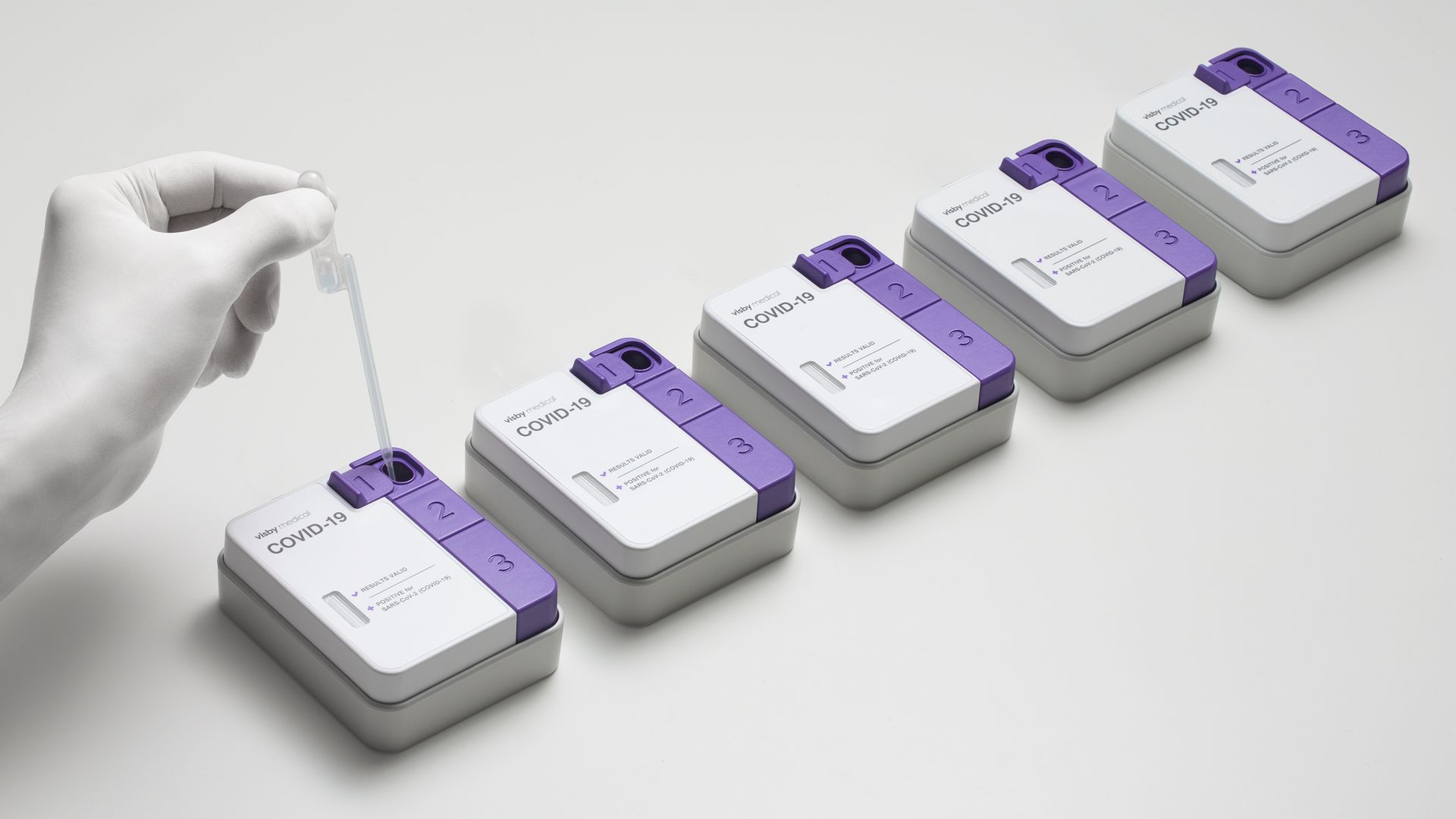| | | | | | | Presented By PhRMA | | | | Vitals | | By Caitlin Owens ·Feb 10, 2021 | | Good morning. Today's word count is 1,034, or a 4-minute read. | | | | | | 1 big thing: Democrats eye big ACA changes in COVID relief bill |  | | | Illustration: Sarah Grillo/Axios | | | | Democrats' coronavirus relief proposal includes major changes to the Affordable Care Act, aiming to make health insurance more affordable for the millions of people who have lost their employer-based coverage during the pandemic. The big picture: These changes would check off a whole lot of moderate Democrats' heath care agenda, at least temporarily. They include some of the biggest changes that President Biden campaigned on. Driving the news: The House Ways and Means committee will begin considering its portion of the relief package today, and the Energy and Commerce Committee will follow on Thursday. Details: The Ways and Means legislation would enhance ACA subsidies for two years. - People making up to 150% of federal poverty would be eligible for fully subsidized plans, and no one — regardless of their income — would pay more than 8.5% of their income for health insurance.
- People receiving unemployment would also be eligible for full subsidies for a year.
- The Energy and Commerce legislation would incentivize states that haven't done so to expand Medicaid.
What they're saying: "Since the enactment of the Affordable Care Act, we have talked about the need to build on and strengthen the policy. We have had virtually no opportunities to make a meaningful contribution toward that end legislatively," said Chris Jennings, a Democratic health strategist. - "This is the first real, significant down payment that we've been able to secure since the policy's enactment."
Yes, but: Notably absent from all of this are policies that would meaningfully reduce the actual cost of care. - Increasing subsidies just means that the government would shoulder more of the burden, while America's extraordinarily high prices go untouched.
- Any attempt to control the cost of care would quickly erode any support from the health care industry.
Go deeper. |     | | | | | | 2. Scoop: Another step forward on rapid testing |  | | | Photo: Visby Medical | | | | The first single-use, highly accurate rapid coronavirus test has received the all-clear from the Food and Drug Administration to be used in a wide variety of settings, per its manufacturer, Visby Medical. Why it matters: Even with vaccines, widespread coronavirus testing is still essential for safely returning to normal life. The big picture: Many rapid tests aren't as reliable as gold-standard PCR tests, but PCR tests can take days to process and require expensive equipment. What they're saying: "This is the first time that anyone has been able to take this gold-standard laboratory equipment ... and put it in a [form] that anyone can just carry in their hand," Visby CEO Adam de la Zerda said. - "The fact that it's single use means you don't have to worry about an instrument and you have unlimited testing capacity," he added. Results take only 30 minutes.
State of play: The FDA authorized the PCR test for use in labs and hospitals a few months ago. This week, the agency said the test can be used in places like airports, schools and businesses, as long as they've received a waiver from the FDA requirement that tests be run by a laboratorian. - The company is producing tens of thousands of tests a month, but is "anticipating to start scaling to the hundreds of thousands of devices per month, and work our way up from there," de la Zerda said.
|     | | | | | | 3. Colleges run into COVID-19 variants |  | | | Illustration: Aïda Amer/Axios | | | | The highly contagious U.K. variant of COVID-19 has popped up on many U.S. college campuses, calling into question their plans to let more students back on campus this spring, the New York Times reports. Why it matters: The U.K. variant is expected to become the dominant strain within the U.S. relatively soon, and colleges' experience with it could foreshadow what's next for society at large, Axios' Marisa Fernandez writes. Students in colleges from all regions of the country — in Texas, Florida, Michigan, California and Louisiana — have come in contact with the B.1.1.7 variant, per the Times. - The University of Michigan identified a cluster positive tests for the variant in its athletic department, which eventually spread to more than 1,000.
- Vanderbilt University said two students violated safety protocols, which snowballed into 100 students needing to quarantine. Tulane University also reprimanded student organizations for breaking social distancing rules.
|     | | | | | | A message from PhRMA | | We are committed to being a part of the solution | | |  | | | | As we usher in a new Congress and new administration, we can all agree that people need quality, affordable health coverage that works when they need it. - We are focused on solutions that help patients better afford their medicines and protect access to innovation today and in the future.
| | | | | | 4. Knowing someone vaccinated helps hesitancy | | Knowing someone who has been vaccinated, and seeing that the vaccine does not produce any significant adverse effects, is emerging as the leading reason people are willing to get vaccinated themselves. Why it matters: This means vaccine hesitancy should diminish naturally as more people are vaccinated, KFF's Drew Altman writes in today's column. By the numbers: 41% of Americans say they know someone who's been vaccinated, and more than half of that group — 52% — say they'll get vaccinated themselves "as soon as they can." - Among people who don't know anyone who's gotten the vaccine so far, just 37% say they plan to get it as soon as possible.
What's next: As broader uptake chips away at vaccine hesitancy, targeted persuasion campaigns can focus on the groups where vaccine hesitancy is likely to be the most persistent, including among Black and rural Americans. - And that additional outreach may be necessary — so far, high-risk and high-hesitancy groups are trailing in exposure to the vaccine.
- In our KFF survey, 51% of white adults said they've either been vaccinated or know someone who has, compared to just 38% for Black Americans and 37% for Latinos.
- Similarly, people with incomes over $90,000 per year were twice as likely as those with incomes below $40,000 to say they've been vaccinated or know someone who has.
|     | | | | | | 5. How to get the vaccines to people of color | | The COVID vaccine campaign can be an opportunity to address long standing disparities in the health care provided to people of color, the Johns Hopkins Center for Health Security said Tuesday in a proposal for how to distribute the vaccines equitably. Why it matters: People of color have been hit especially hard not just by the pandemic, but also by the disruptions caused by it, Axios' David Nather writes. The keys to equitable distribution of the vaccines, per the center: - Engaging repeatedly with Black, indigenous, and people of color communities through "listen-and-plan" sessions.
- Making sure representatives of the communities are active collaborators in the vaccination campaigns.
- Tailoring the vaccine messages to address the specific concerns of the communities.
- Providing enough funding and other resources to ensure that the vaccines are distributed successfully, and then fighting to keep those resources after the vaccination campaigns are over.
- Making sure the campaigns are treated as an opportunity for "meaningful social change," not as a final step that brings everything back to normal.
|     | | | | | | 6. Catch up quick |  | | | Illustration: Aïda Amer/Axios | | | | People might need the coronavirus vaccine annually in years to come, much like the seasonal flu shot, Johnson & Johnson CEO Alex Gorsky told CNBC on Tuesday. The Biden administration announced on Tuesday they will start delivering vaccines directly to community health centers next week in an effort to promote more equity in the vaccine distribution process. Uber and Walgreens on Tuesday announced they will join forces to offer communities of color free rides to vaccination sites. Randi Weingarten, president of America's second-largest teachers union, told the Axios Re:Cap podcast that she "was wrong" to say in September she'd support requiring in-school teachers to take a COVID-19 vaccine once readily available. The FDA announced Tuesday it has issued an emergency use authorization for a new combination antibody drug from Eli Lilly that can treat mild to moderate COVID-19. |     | | | | | | A message from PhRMA | | Biopharma is committed to being a part of the solution | | |  | | | | As we usher in a new administration and Congress, there are many things on which we can all agree, like building a more just, equitable society. | | | | | | Axios thanks our partners for supporting our newsletters.
Sponsorship has no influence on editorial content. Axios, 3100 Clarendon Blvd, Suite 1300, Arlington VA 22201 | | | You received this email because you signed up for newsletters from Axios.
Change your preferences or unsubscribe here. | | | Was this email forwarded to you?
Sign up now to get Axios in your inbox. | | | | Follow Axios on social media:    | | | | | |








No comments:
Post a Comment